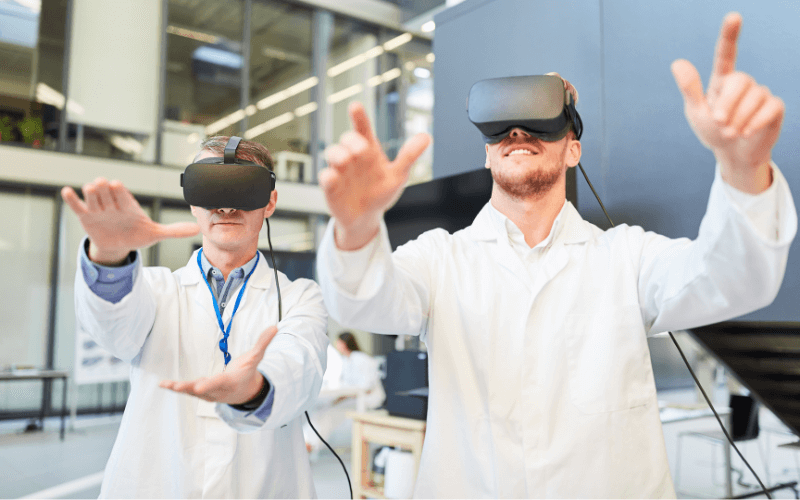Explore how immersive technologies like virtual reality (VR) and augmented reality (AR) in Metaverse are revolutionizing industries such as surgery, sports, welding, aviation, and education, with real-world examples of their positive impact.
In recent years, immersive technologies like virtual reality (VR), augmented reality (AR), and mixed reality have transcended the realm of gaming and entertainment. They are now making a significant impact on various industries, improving training, enhancing skills, and transforming lives. Here are some real-world examples of how these technologies are reshaping the way we work, learn, and connect:
1. Medical Training in VR: Bridging the Surgeon Gap
- Richard Vincent, CEO and co-founder of FundamentalVR highlights the shortage of trained surgeons worldwide, impacting access to safe surgery. VR-based surgical training platforms like Fundamental Surgery offer a risk-free environment for medical teams to enhance their precision skills. The integration of haptic feedback has shown remarkable improvements in surgical proficiency, ultimately benefiting patient outcomes.

2. Sports Skills Enhancement with VR
- English Premier League footballer Marcus Rashford attests to the power of technology, especially VR, in aiding injury recovery and skill development. Immersive technologies are not limited to changing sports but are transforming lives across industries by amplifying potential and expanding possibilities.
3. Athlete Training Revolutionized by VR
- Andy Etches, Founder and sports Director of Rezzil, emphasizes how VR is revolutionizing athlete training across various sports. VR enables athletes to analyze their movements and cognitive skills deeply, fostering greater confidence and competence. In Formula One, it improves environmental reactions and real-time responses, while in football, it enhances precision without physical strain.
4. VR’s Role in Welding Training
- Mary Kelly, President and CEO of StrataTech, discusses the stress reduction associated with VR-based welding training using Ocuweld, a proprietary VR app. This approach empowers students to focus on key aspects, maintain engagement, and practice extensively, making them more employable.
5. Aviation Industry Embracing Virtual and Mixed Reality
- Heike Birlenbach, Senior Vice President of Customer Experience at Lufthansa Group, highlights the aviation sector’s utilization of virtual and mixed reality. These technologies are employed in product development, crew training, mechanic training, and passenger engagement events in the metaverse. They enhance efficiency, reach a wider audience, and improve overall experiences.
6. AR and VR Enhancing Molecular Understanding
- Steve McCloskey, Founder and CEO of Nanome, introduces the educational benefits of AR and VR in understanding molecular structures. Nanome’s platform allows students to engage with 3D molecular models, offering a deeper level of immersion and comprehension. This innovative approach makes science more accessible and boosts engagement and intuition for complex concepts.
The positive impact of immersive technologies is already evident, and as metaverse technologies continue to evolve, we anticipate even more opportunities to harness their benefits across various sectors.
FAQ:
- How will immersive technologies impact the metaverse?
Immersive technologies, such as virtual reality (VR) and augmented reality (AR), are expected to have a major impact on the metaverse. VR will allow users to immerse themselves in the metaverse, while AR will overlay digital content onto the real world. This will make the metaverse more realistic and engaging, and it will open up new possibilities for how people can interact with each other and with the world around them.
- What are the real-world transformations that immersive technologies will enable in the metaverse?
Immersive technologies have the potential to transform the way we work, learn, play, and connect with others. In the workplace, VR could be used for training, collaboration, and remote work. In education, AR could be used to create interactive learning experiences. In gaming, VR and AR could be used to create more immersive and realistic experiences. And in social networking, VR and AR could be used to create new ways for people to connect with each other.
- What are the challenges of using immersive technologies in the metaverse?
There are a number of challenges that need to be addressed before immersive technologies can be widely adopted in the metaverse. These challenges include the cost of hardware and software, the need for high-speed internet, and the potential for motion sickness and other health problems.
- How can we ensure that the metaverse is used for good?
It is important to ensure that the metaverse is used for good and not for harm. This means addressing issues such as privacy, security, and addiction. It also means ensuring that the metaverse is accessible to everyone, regardless of their income or location.
- What are the ethical considerations for using immersive technologies in the metaverse?
There are a number of ethical considerations that need to be taken into account when using immersive technologies in the metaverse. These considerations include the potential for discrimination, the impact on children, and the potential for addiction.